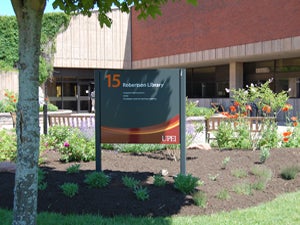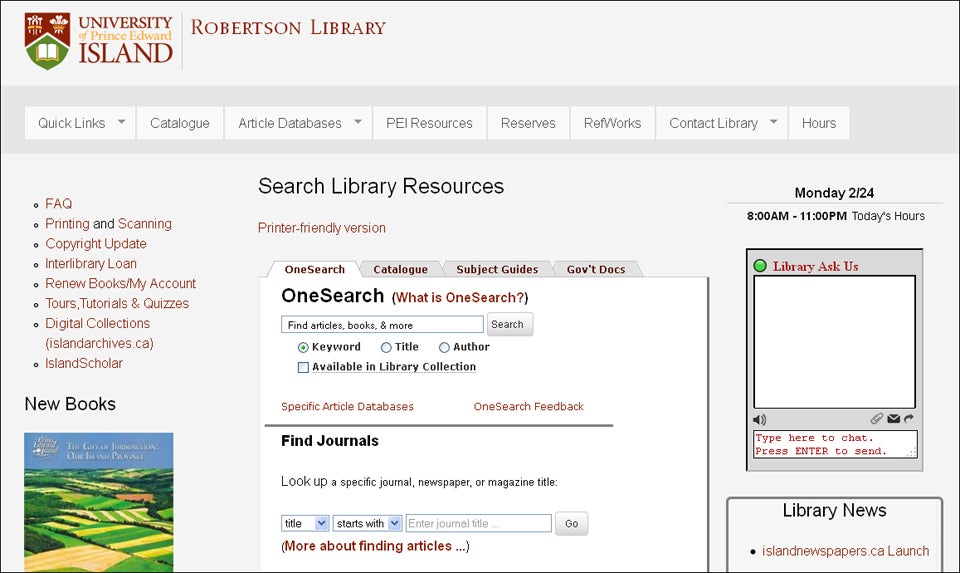
Overview
Located in Charlottetown, the University of Prince Edward Island (UPEI) offers undergraduate and graduate degree programs in the liberal arts, business, education, nursing, science, and veterinary medicine. To support these areas of study, UPEI’s Robertson Library maintains a substantial research collection that includes approximately 419,000 print volumes, 350,000 eBooks, and 150 databases. Serving nearly 5,000 students and faculty members, the Library wanted to surface more of its catalog holdings—particularly its special collections—and secure a greater investment return on its full-text journal packages. EBSCO Discovery Service (EDS), known as OneSearch to UPEI users, provided library leaders with the solution they were seeking. Offering a single search box on the library home page and superior topic searching functionality, EDS has helped UPEI to simplify the discovery process for students and faculty alike.
The breadth and depth of EDS is wonderful for our students, for our faculty, and for the community as well.
The breadth and depth of EDS is wonderful for our students, for our faculty, and for the community as well.
Challenges
Melissa Belvadi, User Experience and Collections Librarian at UPEI, said she and her colleagues sought a way to increase the visibility of the library catalog. Prior to implementing EDS, the library home page featured a “Find Articles” box which searched the library’s EBSCOhost databases but did not include the institution’s catalog records. Although the “Find Articles” box was very popular, students were not finding books. In addition, the library’s full-text journal packages were under-utilized.
“We wanted to better use the materials we were already paying a whole lot of money for,” Belvadi said, adding that the library’s attempt at using a federated search product had failed. “Moving to a discovery service was the next logical step.”
A discovery service, Belvadi said, would help users to unearth more of the library’s unique resources, such as its veterinary medicine collection and the Island Archives, a comprehensive digital collection that details the history of Prince Edward Island.
Finally, the library wanted a discovery product that offered superior subject indexing. Belvadi said this would make the research process easier for the less-sophisticated users who might be tempted to consult a commercial Internet search engine.
Solutions
Implementation
Belvadi, who also serves as chair of the Library Website Committee, led the effort to bring EDS to the Robertson Library. In the fall of 2011, she investigated various discovery products on the market and presented her findings to her library colleagues.
“Once I started researching, it seemed so clear to me that EBSCO was the right choice,” Belvadi explained. “I felt no need to conduct trials on other products.”
As a long-time member of the EBSCO Publishing Academic Advisory Council, Belvadi was already familiar with EBSCO’s products. In addition, UPEI subscribes to a number of EBSCOhost research databases, including Academic Search Complete and Business Source Complete.
“Since we were already so heavily invested in EBSCO databases, it made absolute sense that we needed to buy EBSCO Discovery Service,” Belvadi said. “To use [another product] would be a complete waste for us because all of the content that we care so much about and that we’ve invested in already wouldn’t be properly indexed; the full-text searching wouldn’t be integrated.”
In March of 2012, UPEI made the decision to go with EDS because it offered rich metadata, professionally controlled vocabulary, and easy integration of the library’s other EBSCO products. Librarians spent the spring and summer preparing, and then officially launched EDS—known by UPEI users as “OneSearch”—in August of 2012.
Customization & Branding
The library home page features a single search box, branded as OneSearch, which the implementation team used EBSCO’s Search Box Builder to create. The OneSearch box offers users several options to limit their search results. Radio buttons below the search field allow users to narrow their results by keyword, title, or author.
In addition, users can mark a check box to limit their search to resources that are only available in the library collection. Belvadi said she and her colleagues chose not to make this limiter the search default because some of the library’s holdings—including full-text of the island’s local newspapers—have not been integrated with EDS. Instead, those resources can be accessed by clicking the “Check at UPEI” link resolver button.
“Even if EBSCO doesn’t have the full-text, [users] can click the ‘Check at UPEI’ button to see if the full-text can be accessed elsewhere for free,” Belvadi said. “Letting you as a researcher know that this stuff exists on your topic is the most important thing that an academic library needs to concern itself with. If [users] want to limit their results to just the stuff in our collection, the check box is right there.”
Creating a consistent user experience was also a key step in UPEI’s EDS implementation. The search results page is branded with the University’s maroon and gold school colors and logo, as well as a link back to the library home page.
Belvadi credits her EBSCO Discovery Solutions team with making the process so easy. “EBSCO has gone above and beyond, really helping us every step of the way,” she said. “I just can’t say enough good things about everybody involved.”

Access
UPEI uses a traditional EZproxy® server to authenticate remote users. Belvadi said the library wanted to expose as much of its collection to the public as possible without requiring them to log in. Guest access allows users to see search results and whether a resource is available at the library. Only when they try to access full text are they required to enter a user name and password.
“As the only university for our entire province, we play an important role,” Belvadi explained. “The amount that EBSCO makes freely available to the community is fantastic, and that really helps us serve part of our larger mission as a university in supporting the entire community around us.”
Training & Promotion
OneSearch is taught during library instruction sessions, the first of which occurs in all freshman English composition courses. Students also learn about OneSearch through University 100, a program designed to help first-year students make a smooth transition from high school to college.
Since OneSearch is displayed prominently on the library home page, Belvadi did not see the need to heavily promote the resource.
“If you’re even going to think about doing library research, it’s right there!” she said.
Benefits & Results
Initial usage statistics show that library use between August and November of 2012 had increased 13 percent over the same time period the previous year. In addition, the number of full-text downloads increased by 23 percent.
Belvadi said she hasn’t yet done a formal statistical analysis of OneSearch, but she hopes to see an increase in circulation of the print collection. She also expects to see a spike in Inter-Library Loan activity. In fact, at the beginning of the fall semester, UPEI received ILL requests for two obscure books. Belvadi attributes this to OneSearch.
“It told us that they were using it and finding things they never would have found before,” she said. “The whole point of a discovery service is to help you find things that you wouldn’t otherwise have found.”
Based on feedback collected in the first two weeks after launch, UPEI library users have found OneSearch to be a great starting point for doing research.
“OneSearch is a gem,” said one senior. “It was only after a professor mentioned it and provided a brief overview on how to use it for academic research that I even realized the wealth of information that OneSearch contains. [It is] an invaluable resource that I will miss once I've graduated in May.”
To learn more about EBSCO Discovery Service, or to request a free trial, click here.